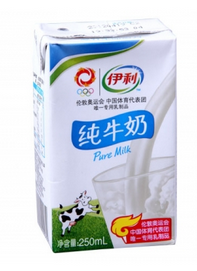In 2008, the Chinese dairy industry hit an all-time low, with 300,000 babies falling ill and six deaths due to the consumption of baby formula tainted with melamine. At the time, 22 Chinese dairy companies were found to have products laced with melamine.
Justice was brought through arrests and sentencing, with some in the scandal even executed, but since then, the Chinese dairy industry suffered major mistrust from consumers.
Even as late as 2013 when expat families with babies moved to China, they were still advised to bring in formula. Hong Kong infamously set a ban on the amount of formula to pass across the border into China in 2013, which was an upset to traders and mainland-based parents alike. In 2016, another formula incident caused mistrust of a different sort, with one imported formula brand being mixed with a domestic brand.
But things seem to have started to turn around for domestic brands. On May 10, the Chinese State Council held a brand awareness poll for consumers. The most recognized brands for dairy products were all Chinese domestic brands (source Sina).

Sina reported that domestic formula accounts for 45% of the market share, and imported brands take the other 55%. Additionally, in 2015 the China Dairy Association released a report stating that a national sampling of dairy products showed a 99.5% pass rate when tested for melamine and other unsafe additives. Dairy companies are taking quality control seriously, of course with the help of government regulation. In October 2016, China’s food watchdog passed tough regulations for infant formula and its advertising.
Local Fresh Milk Fine
Among parents around the city, many feel comfortable with using fresh milk products provided by domestic suppliers. Carol Waigwa, a mother of one who has been breastfed, said she just uses a local brand for herself. “I don’t feel too fussy.”
Denise Forth of the UK said her 8-year-old son, when at school, drinks a Chinese brand of milk. “The last time I bought a big container of milk, I bought from New Zealand. I see that as good milk plus it was cheaper than the local stuff.”
Jessica Qualls, 27, US, said they use SanYuan milk. “It tastes the most similar to what I’m used to and seems to have been reported as a safe brand in the past.”
She lives in Beijing with her husband Chris, 37, US, and their 2-year-old son Graham, with baby number two expected in August.
“Graham is still breastfed and only recently started having any cow’s milk so it hasn’t been something I’ve been super stressed about.”
Trusty Imported Formula
In comparison, when expats parents decide what to use for their newborns, they turn to imported foreign brands.
Rebecca Shook used imported formula for her son until he was one-year-old, then switched to cow’s milk. “We had a pretty easy way of getting formula here so I honestly didn’t even consider using a Chinese brand,” Shook said.
She would have only chosen to dive into Chinese brands if there was absolutely no other option. “I think there’s just too much fake stuff around and too much of a history with formula here to feel 100 percent confident about it.”
When asked what it would take for brands to turn around their image for expat parents, she said, “I think the mistrust is too hard to reconcile among most expat parents. And my Chinese isn’t good enough to really do the research that I’d need to do to feel confident about it.”
Other expat parents reached out for comment said the same, that they were using imported formula for their children, even if the fresh milk they used later or for their own use was Chinese.
Photos: gxjyzp.com, Vanessa Jencks

More stories by this author here.
Email: vanessajencks@truerun.com
Twitter: @vanessa_jencks
WeChat: vanessajencks




